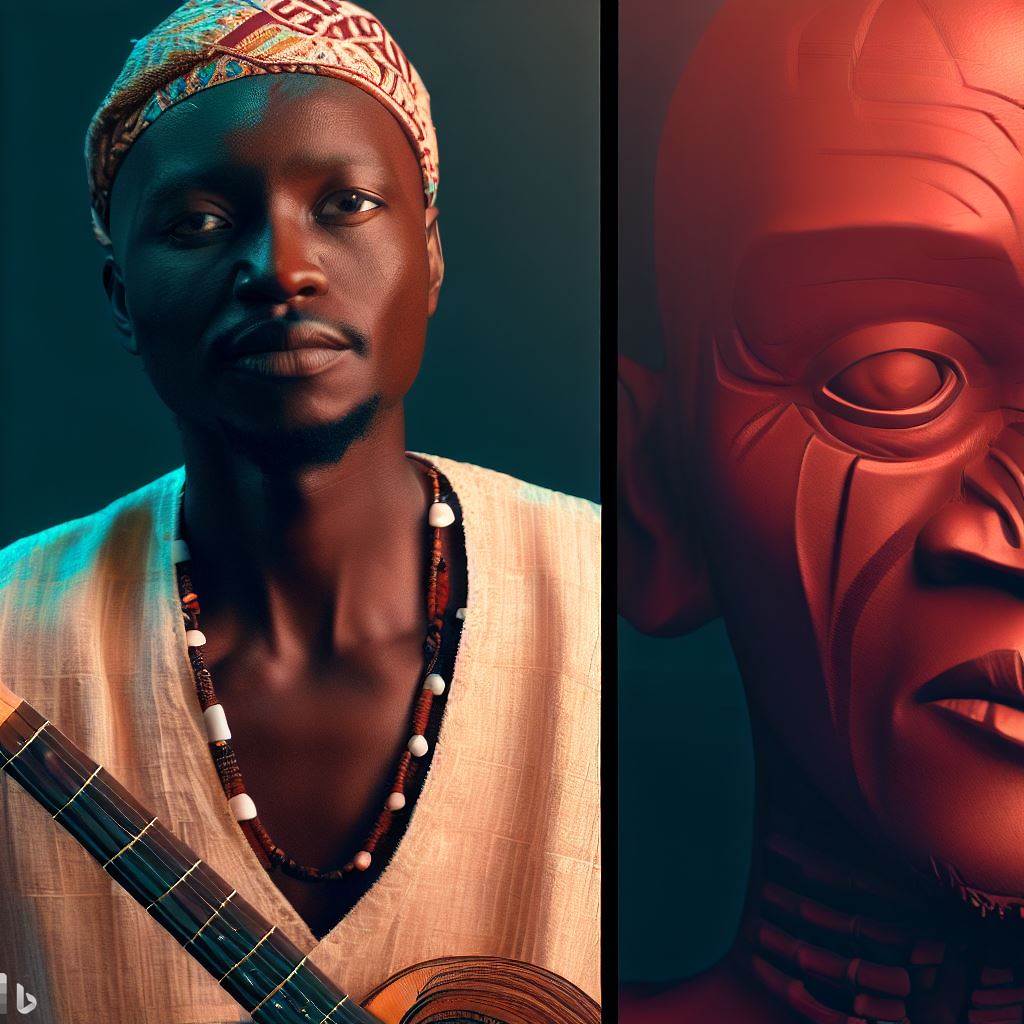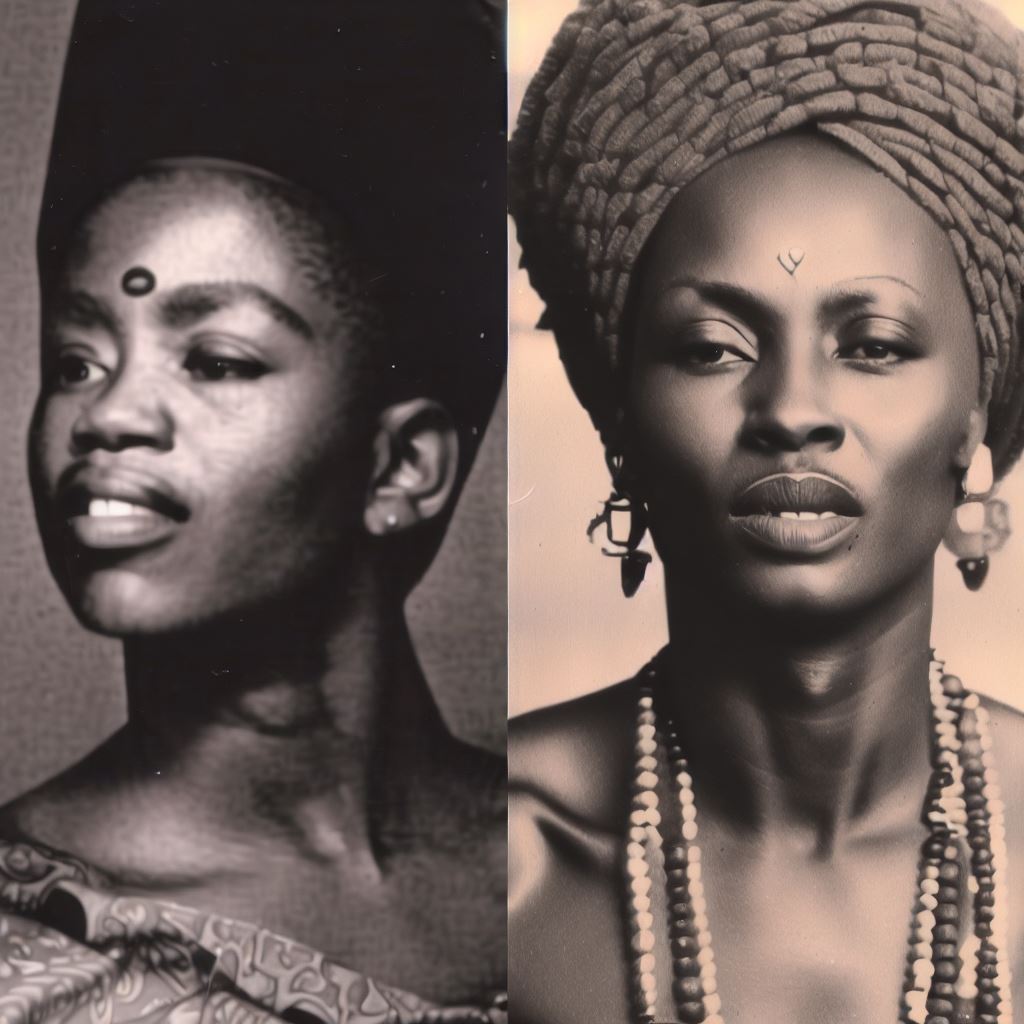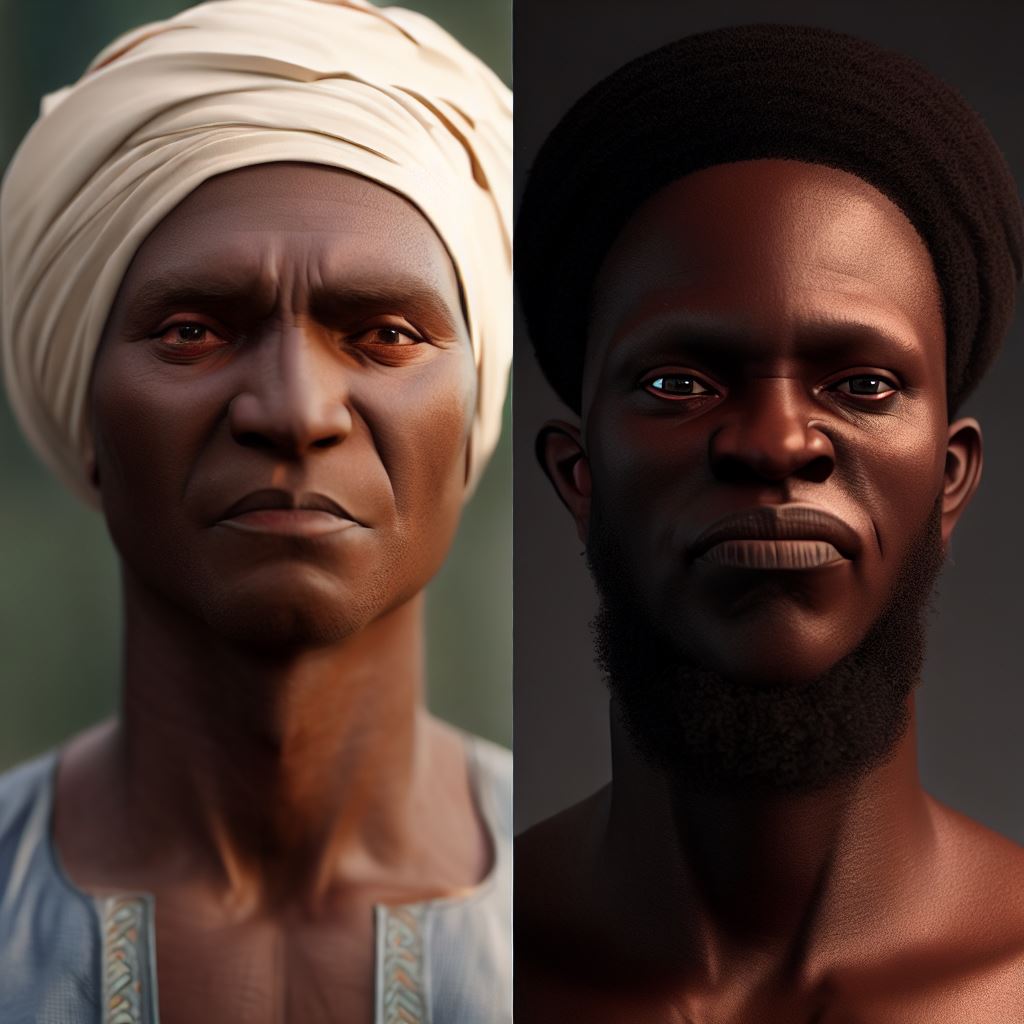Introduction
Let’s explore the crossroads of Nigerian cinema and music.
Nigerian cinema and music have gained significant popularity and recognition worldwide.
The influence and impact of Nigerian cinema and music have been growing tremendously on a global scale.
Nigeria’s vibrant film industry, popularly known as Nollywood, has thrived in recent years.
Alongside this cinematic success, Nigerian music has also been making waves both domestically and internationally.
Nigerian musicians like Burna Boy and Wizkid have achieved massive global acclaim, collaborating with renowned artists from around the world.
This growing influence of Nigerian cinema and music reflects the country’s rich cultural heritage and artistic talent.
The crossroads between Nigerian cinema and music offer a unique and powerful synergy.
Nigerian filmmakers have skillfully integrated music into their films, creating a visual and auditory feast for audiences.
This collaboration has added depth and emotion to storytelling, enhancing the overall cinematic experience.
Moreover, Nigerian music has often played a pivotal role in propelling the success of Nollywood movies, attracting wider audiences and contributing to their global appeal.
The bond between Nigerian cinema and music extends beyond just the entertainment industry.
Through their narratives and lyrics, both mediums reflect the social, political, and cultural aspects of Nigerian society.
They provide a platform for artists to voice their perspectives and encourage discussions on various issues.
This artistic convergence serves to promote Nigerian culture, values, and diversity to a global audience, fostering mutual understanding and appreciation.
In short, the interplay between Nigerian cinema and music has become a significant force in shaping the country’s cultural landscape.
This section will delve into this dynamic relationship, exploring the creative processes, collaborative efforts, and the overall impact on Nigerian cinema and music in the global arena.
Nigerian Cinema and its Rise to Prominence
History and evolution of Nigerian cinema, commonly referred to as Nollywood
Nigerian cinema, also known as Nollywood, has a rich history and has evolved significantly over the years.
It started in the 1960s with the production of Nigerian film, “Palaver,” and has since grown rapidly.
In the early days, Nigerian films were primarily influenced by Western cinema, especially Hollywood.
However, as Nollywood developed, it began to find its unique voice, incorporating Nigerian culture and stories.
Today, Nollywood is the second-largest film industry in the world after Bollywood, producing over 1,000 movies annually.
The growth of Nollywood in terms of production value, quantity, and popularity
Nollywood has witnessed tremendous growth in terms of production value, with movies becoming more visually appealing and technically sound.
Investments from both local and international sources have contributed to the improvement of production quality.
The quantity of movies produced by Nollywood has also increased significantly, reflecting the industry’s rapid expansion.
Nigerian films have gained immense popularity not just in Africa but also internationally, attracting a global audience.
The success of Nollywood can be attributed to its relatability, addressing societal issues and portraying African culture.
The unique characteristics of Nigerian cinema and its contribution to African storytelling
Nigerian cinema has a distinct storytelling style, often blending drama, comedy, and music to engage the audience.
Nollywood movies tend to focus on universal themes like love, family, and social issues that resonate with African viewers.
The industry has also played a crucial role in creating a platform for African actors, showcasing their talent to the world.
Nigerian films celebrate African traditions and cultural diversity, promoting a positive image of the continent.
Furthermore, Nollywood has inspired other African countries to develop their own thriving film industries.
In fact, Nigerian cinema, also known as Nollywood, has experienced significant growth and success in recent decades.
From its humble beginnings to becoming the second-largest film industry globally, Nollywood has made substantial contributions to African storytelling.
Its unique characteristics, focus on relatable themes, and celebration of African culture have earned it popularity and recognition worldwide.
Nigerian cinema’s rise to prominence showcases the power of storytelling and the impact it can have on society, transcending borders and cultures.
Read: Guide to Licensing for Film Composers in Nigeria
The Importance of Music in Nigerian Cinema
The significant role of music in setting the mood and enhancing storytelling in Nigerian films
Music plays a crucial role in Nigerian cinema, elevating the viewer’s emotional engagement and enhancing the overall storytelling experience.
It sets the mood, creating an immersive experience and allowing audiences to connect with the characters and their emotions.
The right music can make a scene feel intense, joyful, or heartbreaking, adding depth and nuance to the narrative.
By creating a powerful connection between the storyline and the viewer’s emotions, music has the ability to leave a lasting impact.
Popular music genres featured in Nigerian cinema, such as Afrobeat, highlife, and gospel
Nigerian cinema incorporates a diverse range of music genres, each with its unique characteristics and cultural significance.
Afrobeat, with its infectious rhythms and energetic melodies, is a popular choice in Nigerian films, reflecting the country’s vibrant music scene.
Highlife, a genre that originated in Ghana but has gained popularity in Nigeria, adds a touch of nostalgia and authenticity to many films.
Gospel music, known for its spiritual and uplifting qualities, frequently accompanies scenes that depict religious or moral themes.
The blending of these genres not only showcases Nigeria’s rich musical heritage but also adds layers of depth and meaning to the films.
Collaboration between filmmakers and musicians to create powerful cinematic experiences
The collaboration between filmmakers and musicians is an essential element in creating impactful cinematic experiences in Nigerian cinema.
By working hand in hand, filmmakers and musicians can effectively synchronize the music with the visuals, enhancing the emotional resonance of the film.
Composers and music directors carefully choose or create original soundtracks that complement the narrative, heightening tension during suspenseful moments
and evoking joy during celebratory scenes.
This collaboration often leads to innovative storytelling techniques, where the music becomes a character itself, driving the plot forward and shaping the audience’s perception.
Furthermore, featuring popular musicians in films can attract a wider audience, as fans connect with their favorite artists’ on-screen performances.
Ultimately, the collaboration between filmmakers and musicians creates a harmonious union of visual and auditory elements, resulting in a powerful cinematic experience.
In essence, music in Nigerian cinema holds immense importance in setting the mood, enhancing storytelling, and creating emotional connections.
From Afrobeat to highlife and gospel, the diverse musical genres add depth and cultural significance to the films.
The collaboration between filmmakers and musicians further enhances the cinematic experience, allowing for innovative storytelling techniques and wider audience appeal.
Understanding the role of music in Nigerian cinema is crucial in appreciating the artistry and cultural impact of this thriving film industry.
Read: Pioneering Female Film Composers in Nigeria

Nollywood Soundtracks and Their Impact
Influence of Nollywood soundtracks on shaping popular music trends in Nigeria
- Nollywood soundtracks play a significant role in shaping the popular music landscape in Nigeria.
- They create a bridge between the music industry and the film industry, resulting in a mutual exchange of ideas.
- The incorporation of catchy tunes and infectious rhythms in these soundtracks influences listeners and sparks new music trends.
- Nollywood soundtracks often reflect the cultural and social contexts of Nigerian society, making them relatable to the masses.
- They provide a platform for musicians to experiment with different genres and showcase their talent to a wider audience.
Success stories of musicians who gained prominence through Nollywood movie soundtracks
- One notable success story is that of legendary musician King Sunny Ade, who gained recognition through his soundtrack contributions to Nollywood films.
- Ade’s fusion of juju music with Nollywood soundtracks led to an increased fan base and paved the way for his international success.
- Another example is singer-songwriter Onyeka Onwenu, whose powerful vocals captivated audiences in Nollywood movie soundtracks.
- Onwenu’s collaborations with Nollywood filmmakers propelled her into the limelight and solidified her position as a music icon in Nigeria.
- These success stories demonstrate how Nollywood soundtracks can serve as a launchpad for musicians, exposing them to greater opportunities and acclaim.
The symbiotic relationship between Nollywood filmmakers and musicians
- Nollywood filmmakers and musicians have a mutually beneficial relationship, leveraging each other’s talents and platforms.
- Filmmakers benefit from the popularity of musicians, as the inclusion of their songs in soundtracks attracts a larger audience.
- Musicians, on the other hand, gain exposure and recognition through their contributions to Nollywood soundtracks.
- This collaboration allows filmmakers to enhance the emotional impact of their movies through carefully selected and crafted music.
- Musicians receive royalties and increased sales as their songs gain wider visibility through the popularity of Nollywood films.
- The symbiotic relationship between Nollywood filmmakers and musicians fosters a vibrant creative ecosystem in Nigeria’s entertainment industry.
In general, Nollywood soundtracks play a crucial role in shaping popular music trends in Nigeria.
They influence listeners, reflect societal contexts, and provide a platform for musicians to showcase their talent.
Success stories of musicians like King Sunny Ade and Onyeka Onwenu highlight the impact of Nollywood movie soundtracks in boosting their careers.
The symbiotic relationship between Nollywood filmmakers and musicians forms a strong foundation for collaboration and growth in Nigeria’s entertainment industry.
Read: The Changing Trends in Nigerian Film Music
Nigerian Musicians as Actors in Nollywood
The trend of musicians transitioning into acting roles in Nollywood films
Today, it has become increasingly common to see Nigerian musicians trying their hand at acting in Nollywood.
This trend has gained traction over the years, with several well-known artists successfully making the transition from music to the silver screen.
Notable musicians who have ventured into acting include Banky W, Femi Kuti, and Davido, among others.
They have not only showcased their musical prowess but have also demonstrated their acting abilities, receiving praise and recognition for their performances in various Nollywood films.
Impact of popular Nigerian musicians starring in movies on the commercial success of those films
The involvement of popular Nigerian musicians in Nollywood movies has had a significant impact on the commercial success of these films.
Their star power and large fan bases attract a broader audience to the theaters, resulting in increased ticket sales and higher box office returns.
For instance, when Banky W starred in the blockbuster film “The Wedding Party,” the movie experienced a surge in popularity due to his presence.
Many fans of his music were eager to see him on the big screen, leading to record-breaking numbers at the box office.
Benefits and challenges faced by musicians venturing into acting
The decision for musicians to venture into acting comes with both benefits and challenges.
One of the major advantages is the opportunity for artists to expand their creative horizons and explore new avenues of self-expression.
Acting allows them to tap into their talent and showcase their versatility as performers.
It also opens up new career opportunities for collaborations within the entertainment industry.
However, venturing into acting also presents challenges for musicians.
They may face criticism from the public and skeptics, who question their credibility and ability to deliver convincing performances.
Furthermore, the pressure to succeed in the new field of acting can be overwhelming, as musicians have to prove themselves beyond their musical talents.
In general, the trend of Nigerian musicians transitioning into acting roles in Nollywood has become a prevalent phenomenon.
The impact of popular musicians starring in movies has proven to be highly beneficial for the commercial success of these films.
However, musicians must also navigate the challenges that come with venturing into acting, including the need to overcome public skepticism and deliver performances that go beyond their musical talents.
Overall, this trend showcases the diversity and talent that Nigerian artists possess, as they continue to captivate audiences both within and beyond the realm of music.
Read: Technology’s Role in Nigerian Film Composing
The Global Appeal of Nigerian Cinema and Music
International recognition and appreciation of Nigerian films and music
Nigerian cinema and music have gained significant recognition and appreciation on the international stage.
Nollywood, the Nigerian film industry, is currently the second-largest film industry in the world by volume.
International film festivals now feature Nigerian movies, showcasing their artistic and storytelling prowess.
Nigerian music, particularly Afrobeats, has also gained global popularity, merging Western and African music elements.
A-list Nigerian musicians regularly collaborate with renowned international artists, further solidifying their recognition.
Publish Your Professional Profile, Business or Brand
Showcase your expertise, gain trust, and boost visibility instantly on Professions.ng.
Publish NowThe influence of Nigerian cinema and music on African diaspora communities worldwide
Nigerian cinema and music have become powerful tools for cultural expression among African diaspora communities.
The portrayal of Nigerian culture in films and songs resonates with Africans living outside their home countries.
Nigerian movies and music serve as a reminder of cultural heritage, evoking a sense of pride and unity.
They often tackle social and political issues relevant to Africans globally, fostering a sense of collective identity.
African diaspora communities organize screenings, concerts, and events to celebrate Nigerian cinema and music.
Potential for further growth and cultural exchange through collaborations with international artists and filmmakers
Collaborations between Nigerian artists and international counterparts provide exciting opportunities for cultural exchange.
International artists are increasingly recognizing the innovation and creativity within the Nigerian entertainment industry.
Joint projects promote diversity by blending different artistic styles and influences.
They also enable Nigerian artists to gain exposure in global markets, expanding their fan bases and potential revenues.
Mutual collaborations can lead to the discovery and appreciation of new talents from both Nigeria and other countries.
Conclusion
In summary, the crossroads of Nigerian cinema and music have been explored in this section.
This intersection holds great significance in shaping Nigerian culture and impacting the global entertainment industry.
As we conclude, let us reflect on the rich history and potential of Nigerian cinema and music, encouraging further exploration and appreciation.
In this chapter, we explored:
- Symbiotic Relationship: Nigerian cinema and music share a dynamic, symbiotic relationship, with both industries influencing each other.
- Cultural Representation: Nigerian cinema mirrors the rich diversity of music genres, showcasing the nation’s multiculturalism.
- Global Impact: This intersection has propelled Nigerian culture onto the global stage, attracting international audiences.
- Afrobeats Revolution: The rise of Afrobeats music has been instrumental in Nigerian cinema’s global recognition.
- Creative Collaborations: Musicians like Burna Boy and Wizkid have made successful transitions into acting, bridging the gap further.
- Narrative Enhancement: Music enriches cinematic narratives, providing emotional depth and cultural context.
- Economic Boost: Together, they’ve bolstered Nigeria’s economy and created numerous job opportunities.
This intersection is pivotal in shaping Nigerian culture and making waves globally. It reflects the nation’s spirit and resilience.
In a world hungry for authentic storytelling, Nigerian cinema and music stand as a testament to the power of culture.
Their harmonious blend inspires, educates, and entertains, inviting us to explore the intricate tapestry of Nigeria’s artistic heritage.




